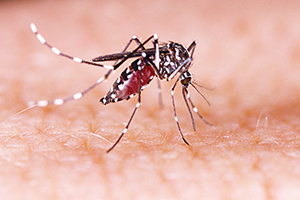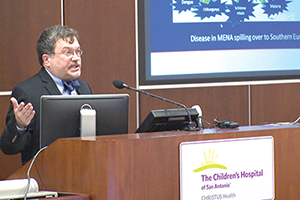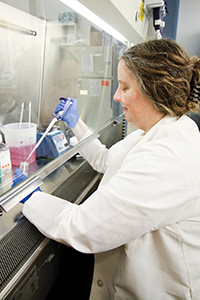By BETSY TAYLOR
Researchers at Saint Louis University's Center for Vaccine Development are putting in long days, gearing up for the center's upcoming clinical trial of a vaccine to prevent the transmission of Zika, a virus spread by mosquito bite that can cause profound birth defects.

© Tacio Philip Sansonovski
Dr. Sarah George, an associate professor of infectious diseases at Saint Louis University who sees patients at SSM Health Saint Louis University Hospital, is leading the medical school's upcoming human trial of a Zika vaccine developed at Walter Reed Army Institute of Research. The SLU center's trial will include 90 healthy adults, between the ages of 18 and 45, who will be given two doses of vaccine a month apart, and then monitored throughout the year to determine if the vaccine induces a safe immune response, she said. The trial, tentatively planned to begin in September, will include a partnership with a research site in Puerto Rico, where mosquitoes are transmitting the virus.
The vaccine is one of a handful of immunizing agents being developed and tested to protect against Zika, she explained. "This is an urgent health problem," George said. In early August, the Florida Department of Health said it identified 14 cases of Zika caused by mosquitoes in the Wynwood neighborhood of Miami. The Centers for Disease Control and Prevention advised pregnant women not to travel to this neighborhood, and said pregnant women and their partners living in the neighborhood should take precautions and prevent mosquito bites.
The World Health Organization declared a Zika health emergency in February, due to the spread of the virus in Latin America and the Caribbean and its potentially devastating effects on fetal development. People generally contract the Zika virus from the bite of an infected mosquito. The virus also can be transmitted through sex, according to the Centers for Disease Control and Prevention.

Dr. Peter Hotez, the dean of the National School of Tropical Medicine at Baylor College of Medicine and chair in tropical pediatrics at Texas Children's Hospital in Houston, speaks at a July 15 Zika educational event at The Children's Hospital of San Antonio.
(Courtesy of CHRISTUS Santa Rosa Health System)
Zika can be passed from a pregnant woman to her fetus, and infection during pregnancy has been linked to a rise in stillbirths and certain severe birth defects, including microcephaly. Microcephaly is a neurological condition in which an infant's head is significantly smaller than normal, usually due to abnormal brain development, according to the CDC. Researchers have linked Zika infection in adults in rare cases to Guillain-Barré syndrome, a condition in which a person's immune system damages nerve
cells causing weakness and paralysis in some cases.
The species of mosquitoes that carry Zika — Aedes aegypti and Aedes albopictus — do live in the U.S., and usually in higher concentrations in the South. More than 6,000 cases of Zika were reported in people residing in the U.S. and U.S. territories in late July, including more than 800 pregnant women with evidence of Zika virus infection, the CDC said. It is believed the vast majority of them traveled to countries hard-hit by Zika, or may have a partner who traveled to these areas.
Accumulating and sharing information
At health care organizations including ministry hospitals, clinicians are fielding questions from community members, advising women who are pregnant or who want to conceive and their partners to cancel or avoid travel to areas where there are mosquitoes known to be carrying the Zika virus. Clinicians are advising other precautions, such as wearing long pants and sleeves, and wearing CDC-approved types of insect repellent to prevent mosquito bites.
Dr. Mitchell Blass at Emory Saint Joseph's Hospital in Atlanta recorded a video that has been shared with the public on Emory's website explaining that Zika was first described in 1947 in Uganda, when serologic evidence showed about 6 percent of the Ugandan population had at one time been infected with Zika without much recorded in the way of adverse effects at the time. In 2007, much of the population of the Micronesian Yap Islands was infected with reports of mothers delivering babies with microcephaly.
Scientists are conducting research to better understand several aspects of Zika virus transmission and its effects, such as why the birth defects have occurred in more recent years and the long-term effects for babies who are infected in utero. The CDC says once someone has been infected with Zika and the virus clears their system, it's "very likely" they are protected from future infections. There is no evidence that past Zika infection in a woman poses an increased risk of birth defects in future pregnancies.

Blass
Many people infected with Zika may be asymptomatic, or else experience fairly mild symptoms, like a headache, fever and rash, Blass explained. He said a blood test is available to test patients who are concerned that they may have been exposed to Zika, and if patients are concerned, they should talk with their doctor.

Dr. Sarah George is the principal investigator on a National Institutes of Health directed human trial of a Zika vaccine to be conducted by Saint Louis University's Center for Vaccine Development. She is nationally known for her work in dengue vaccine development.
(Photo by: Ellen Hutti)
San Antonio prepares
In another example of public outreach, The Children's Hospital of San Antonio, a CHRISTUS Health hospital, organized a symposium on Zika, which it livestreamed and recorded, on June 15. Medical and nursing students, lab technicians, representatives of community health organizations, lawmakers and the media attended. It was called "From A to Zika: What you need to know about the virus."
A panel of doctors and scientists spoke about the history of Zika, its transmission and the public health planning in San Antonio, such as surveillance, including the trapping and testing of Aedes mosquitoes to make sure they're not carrying the Zika virus, and plans for electronic mapping that would delineate where to temporarily limit blood bank donations within a geographic radius if Zika is discovered in a particular neighborhood.
The mapping being tested around San Antonio considers the travel distance of the mosquitos, and would project a radius around the spot where Zika was located. Residents who lived at addresses within that radius would be asked not to donate blood until possible transmission had been ruled out in the geographic area. The South Texas Blood & Tissue Center in West San Antonio started testing blood donations for Zika virus in July.
Protecting blood supplies
In areas of active Zika transmission, the U.S. Food and Drug Administration is recommending that blood either be screened by laboratory testing, subjected to technology that reduces pathogens, or obtained from other areas.
As Catholic Health World went to press, the FDA has specifically requested that blood donations stop in Miami–Dade County and Broward County until the establishments collecting blood can test blood for Zika or use technology that inactivates pathogens. The agency recommended that adjacent and nearby counties institute the same precautions.
The FDA said it was working closely with companies that are making blood screening tests available. It said blood collection organizations could participate in blood testing for Zika, even in areas without local mosquito-borne transmission of Zika.
| CHA ethicist frames ethical issues related to Zika virus Fr. Tom Nairn, OFM, a CHA senior director of theology and ethics, said much of Catholic ethical reflection on the Zika virus has focused on pregnant women who may become infected with the virus, because the virus has been linked to birth defects. "Both the World Health Organization and the U.S. Centers for Disease Control and Prevention have recommended that women who are pregnant should either use a condom every time they have sex or not have sex during the pregnancy. "Some organizations have argued that both contraception and abortion need to be considered as effective tools for dealing with the Zika virus," he said. "While allowing abstinence, Catholic moral teaching has strongly maintained that both abortion and contraception are immoral, even when used as means to achieve what the person considers a good end. The Catholic Church considers any use of condoms immoral, even if the intention is to prevent the transmission of disease," he explained. "This past February, however, Pope Francis added to the controversy by seeming to qualify the prohibition regarding contraception. He stated in a press conference that abortion was an 'absolute evil' but added that in circumstances like that of combating the Zika virus, contraception may be considered a lesser evil," Fr. Nairn said. "Later, the Pope's spokesman, Fr. Federico Lombardi, further explained, 'The contraceptive or condom, in particular cases of emergency or gravity, could be the object of discernment in a serious case of conscience.'" Fr. Nairn added, "This focus on contraception has overshadowed other ethical issues. Among these are a society's responsibility to care for children born with microcephaly or similar medical conditions because of the virus, especially poor children. There is also the individual's responsibility to protect oneself from the virus and the care that needs to be taken not to infect others. "There are also ethical concerns regarding public policy, especially in the allocation of limited health resources," Fr. Nairn said. Among these: "How should spending be divided among trying to eradicate the cause of the infection, developing a future vaccine, or educating the public? "Finally, at least at this point in time, the virus has been especially rampant in poor countries and in poor areas of those countries, where people are least able to prevent the infection or to cope with it. What is the responsibility of the global community to these sisters and brothers?" Fr. Nairn asked. |
Copyright © 2016 by the Catholic Health Association
of the United States
For reprint permission, contact Betty Crosby or call (314) 253-3477.